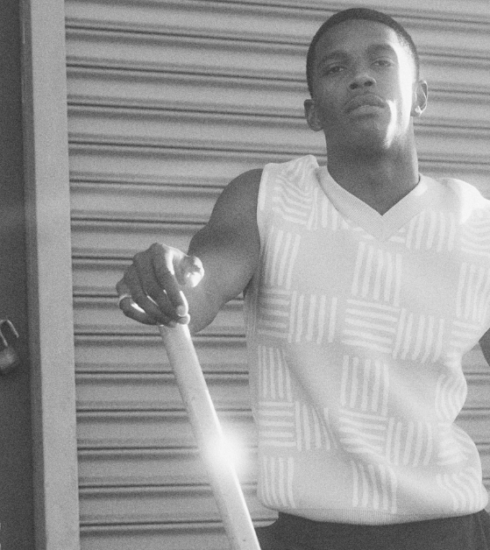Introducing Hymnson Chan, the renowned award winning stunt performer and actor
I had the pleasure of speaking with Hymnson Chan, a multi-talented and award-winning stunt performer and actor, during AAPI month. The conversation was excellent, and I had the opportunity to gain insights into his journey in the industry from both perspectives. During our discussion, we explored his most recent appearance on HBO’s popular series, Curb Your Enthusiasm, as well as his achievement of winning a SAG Award for his stunt work in Marvel’s Avengers: Endgame. We concluded our delightful conversation by delving into the significance of representation and exploring his personal interpretation of AAPI month.
You excel in both acting and performing stunts. How did you begin your journey in both spheres?
Growing up with my dad as a Pastor, I’ve seen firsthand how “storytelling” can change people’s lives, and I was raised to stand up and uplift those who are oppressed and underrepresented. For the longest time, Asians weren’t portrayed in particularly positive lights and often were the punchline of jokes or used as the “model minority” to put down other minority groups. So, I was very motivated to change those perspectives and show that we all have more in common than not. Asians are just like any other people with layers, nuances, and experiences, both positive and negative, so I set out to Hollywood to make that change and fight for better representation, focusing on AAPIs, but for minorities as a whole.

Where do you find inspiration when it comes to acting?
I’m inspired by actors that can flow so easily and skillfully between comedy and drama. Actors like Donald Glover, Bryan Cranston, Steve Carrell, Jamie Foxx, and Meryl Streep have set the bar so high but show that it’s possible. Even Timothee Chalamet has really grown on me because he initially broke into stardom through his dramatic work and seemed like a very serious actor, but when I saw him killing it on Saturday Night Live and just having fun, I couldn’t help but become a fan!
Where do you find inspiration when it comes to stunt work?
Fight choreography is my biggest love when it comes to stunts, and having done it for nearly 15 years, it’s turned me into a bit of a fight snob and more critical of fight scenes than the general audience. But I always find inspiration from learning new techniques from different martial arts and tactical skills, watching classic martial arts/action movies, and finding fun and exciting ways to combine the new and old. Even the top action design teams like 87Eleven with Chad and David will tell you how much they’ve been influenced by Jackie Chan, Donnie Yen, and other legends from Hong Kong cinema, so they pay tribute to them in their projects.
As a stunt performer, you often subject your body to physically demanding conditions. How can you maintain your body in optimal condition? What is your typical workout and eating routine like?
Stunt performers are the professional athletes of the entertainment industry, and a strict routine and diet are important. Still, when we’re busy working or booked on long runs, it’s hard to have any type of “regular routine.” My diet probably could use more discipline because I’m a sucker for sweets, so sometimes I have to ramp up my workouts more to offset those extra calories. But I try to eat clean and always have some type of veggies, protein, and whole grains on my plate each meal. Typically for workouts, I do a lot of cardio (5k warm-up run three times a week), stretches, and variable strength training because we constantly work 12+ hour days on set, and when you’re doing take-after-take, it’s important to have that endurance to be at your best from the first take to the last. When people tire out or lose focus, accidents, and injuries rear their ugly heads, so we do everything we can to keep everyone safe and home in one piece.
When we consider entertainment, we often overlook the stories of stunt performers. What does it entail to embark on a career as a stunt performer in the industry?
It’s true that stunt performers often get overlooked, especially when working as a stunt double; it’s literally your job to make sure no one notices that it’s you on screen. Then add, on top of that, the actor gets all the credits for the work YOU did. Granted, some actors gladly give that recognition to their stunt double and stunt team, but it’s inherently a thankless job, so humility is just as important as any physical skill. Being a stunt performer does bring a lot of respect on set, but at the same time, you’re easily replaceable. However, that’s just the nature of the job sometimes. So, if anyone is considering a career in stunts… Thick skin and no ego are a must.

What did winning a SAG Award for your stunt work in Marvel’s Avengers: Endgame mean to you? If someone is interested in pursuing a career in stunt performance, what advice would you offer them before starting their journey? What are some fundamental facts that you believe everyone should know without any room for debate?
It was a very special feeling to have won a SAG Award, let alone any award for your work, but it’s only reinforced my belief that this career is absolutely all about teamwork. The stunt team on Avengers: Endgame was one of the best collections of talent I’ve ever worked with and because of the scope of such a massive movie, no one person could carry that burden so we were there to uplift and make one another better.
The biggest piece of advice for someone interested in pursuing stunts is something that’s been ingrained in my brain thanks to veteran stuntman Eddie Braun… and his advice is, “Ego is not your amigo.” You could have all the physical skills in the world and be the most talented performer anyone has ever seen, but none of that matters if your ego overshadows all of that, and no one is going to want to work with you. Of course, training your physical skills is important… learn martial arts and fight choreography, practice sliding cars, work on high falls and fire burns (under professional supervision), and make sure you’re at a consistent, professional level. But when a Stunt Coordinator is considering a hire, their biggest question is, “do I want to spend 12 hours with this person every day?” And that isn’t only applicable to stunts, but as an actor, as a coworker, as a human being… if no one wants to be around you then you’re not going to get very far. Success is a collaborative effort.
You express strong concerns regarding the under representation of stunt performers. Why do you think there is this lack and why is it important to combat it?
People have made the comparison that if Hollywood was a high school, stunts would be the jocks. So I think there’s been a stigma against stunt performers that we’re just meatheads that take hits and fall down and that it’s a job that’s based solely on physical abilities, so it’s not as much of a creative or artistic endeavor as other departments… wouldn’t and couldn’t be farther from the truth. Especially with the rise of stunt previz, the Stunt Community is filled with so many incredible filmmakers that can film an action sequence as easily as be in an action sequence.
Not to mention, there are very few Stunt Coordinators of color who are working consistently in this industry. The scarcity of work for minorities can lead to undue competition, jealousy, and even some ugliness I’ve seen over the years. Even though I’m still young in my Coordinating career, I’ve been trying to mentor and create a pipeline of diverse Stunt Coordinators along with my good friend and stuntman extraordinaire, Terrence Julien.

How do you think the industry can be more conscious of its efforts to increase it?
I first have to give a big shoutout to the team behind “The Fall Guy,” which is one of my favorite movies this year! Director David Leitch and Stunt Designer & Coordinator Chris O’Hara made the stunt community proud of this one. The sequences were spectacular! Literally, world record-setting stunts and the average movie-goer has absolutely no idea how difficult and dangerous that task was to achieve so huge props to them! This brings up an important point… stunt performers are the ONLY people who show up to work on set knowing that there is a chance that they could get hurt. We’re the only department that puts our bodies on the line for the audience’s entertainment, and that gets overlooked way too often.
There’s been a lot of progress with stunts getting their overdue and well-deserved recognition, but I think the last big domino that remains to fall is the Academy Awards recognizing the influence and contributions the Stunt Community has made to the film-making industry by creating a Stunts category for the Oscars.
However, I also think the industry needs to do more to take care of stunt performers in terms of health care and retirement benefits. There’s a reason why you see few career stunt performers past their 40s and 50s. I’m still in my 30s, but my knees and lower back are probably the equivalent of a 70-year-old’s by now, so we need to take better care of the stunt performers who have sacrificed so much (physically, emotionally, and mentally) to push the entertainment industry forward.
Curb Your Enthusiasm is an iconic show. Tell me about the moments from when you received the audition opportunity to landing the role.
Initially, I was a bit apprehensive about the role because it required an Asian accent. First of all, I thought I sucked at doing those anyways, but more importantly, Asian accents on-screen can be a triggering thing for Asian actors and audiences. For far too long in TV & film, an Asian accent was used as an offensive way to mock Asians just for the sake of a laugh. I’ve turned down job offers because of that… but an important factor in accepting this particular role was the realization that the joke works because of the accent, but the joke isn’t the accent. So, that was an important distinction for me.
Could you please share more about your character in the show?
My character and Larry’s rivalry gets sparked by a very unusual situation that involves a struggling goldfish at a restaurant. Things quickly escalate, and we get into one of those iconic Larry shouting matches, but it actually leads Larry to a philosophical epiphany later on. Then, in another episode, I have another run-in with Larry during Ted Danson’s performance in the play “A House Divided”, which ends in a very embarrassing moment for one of us. If you’re a fan of the show then I’m sure you can guess who, haha.
When you first developed this character, what sources of inspiration did you draw from? What factors did you consider that were influencing their behavior?
My character was inspired by a mix of comedian Tim Robinson and my dad. The situation between my character and Larry was so outlandish, but our job is to keep it as grounded as possible, so it reminded me of the show “I Think You Should Leave with Tim Robinson” when Tim plays these different characters who get caught in a lie or is clearly guilty of something but will go to extreme lengths to stick to their story.
But also my dad was essentially who I based my character’s accent off of. Granted his accent isn’t as thick as my character’s but it was important that the accent was based off someone real so that my character could feel authentic and not a mockery of a culture.

It’s AAPI, and I’m delighted to have the opportunity to share your story in celebration. What is the significance of AAPI month for you?
National AAPI Month is very important because it’s a reminder that Asian Americans are, first and foremost, Americans. Maybe one day we can lose that qualifier of “what type” of American we are and just be known as Americans. But AAPI Month is an opportunity to showcase the contributions from AAPIs that have influenced and impacted not just the Asian community but this country as a whole. Despite making many historical contributions, though, the Asian community has also dealt with overwhelming oppression and racism that should never be forgotten or repeated… like the Chinese Exclusion Act of 1882, the Japanese internment camps of WW2, and the more recent murders of Vincent Chin and Vicha Ratanapakdee who were killed solely because they were Asian.
We use this month to remember the good and bad, but just as important, it’s a month to show the AAPI community that we are valued citizens of this great nation as well. We use this month for everyone to stand together.
There has been a noticeable increase in television shows and films that showcase an all-AAPI cast or compelling lead actors. Why do you believe it is crucial to witness more stories like these being portrayed on the screen?
UCLA released a recent study that showed women and people of color drove the biggest box office movies in 2023, as well as 17 of the top 20 shows on streaming. And it’s been a growing trend over the past decade, so having more diverse stories being told (including AAPI) isn’t just lip service to minorities or a smart business strategy, but it empowers minorities to make their voices heard and be seen as they deserved to be, both on and off-screen.
It’s amazing that some shows and films showcase an all-AAPI cast nowadays because it shows the range of characters that we can play, but I think it’s also important to be inclusive of other ethnicities and cultures as much as possible. We don’t want Asians to be an isolated group and just have “our own” shows, but we want to be accepted by all people and work together with other groups because that’s a more honest reflection of what the world is actually like.
Can you imagine what it would have been like for a young Hymnson to have grown up watching shows and movies such as Crazy Rich Asians, Joy Ride, Shogun, and The Brothers Sun?
If young Hymnson had grown up with those types of shows and movies, that would’ve instilled a lot more confidence and ambition for storytelling into me a lot sooner. It’s so much easier to achieve something when you see someone like yourself do it first, so if I had grown up having those types of projects to look up to and be inspired by, I would’ve had such a better and earlier head start. Representation matters!
Would you like to see more AAPI-specific cultural stories on television or film?
100000%!! We’ve hit new heights in AAPI stories on TV and film with shows like “Warrior, Shogun, Brothers Sun, The Sympathizer, Beef and Tokyo Vice” but that’s only scratching the surface of what is possible and what’s in development. I foresee a lot of incredible projects in the works and I hope to be a part of it as much as possible but either way, I’ll be supporting my fellow AAPI creatives no matter what.
Photography Credit: Jason Rivera






